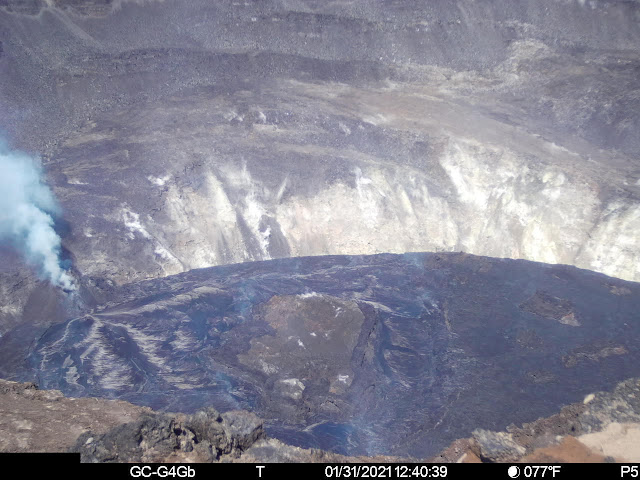The rains, for now, have paused. Birds are easily heard, hale is quiet. Sun comes and goes through broken overcast, and all is as it should be.
The work of Pelehonuamea continues. Subtle are the changes or differences day-to-day. Volumes erupted fluctuate, the West Vent seems not as active as it has been, and Iʻll guess that vog on the West side of the Island of Hawaiʻi has diminished.Volcano Watch: Words matter...
The text follows. I trust that itʻs legible:
The one that jangles me the most is "smoke". Noooo....Itʻs not smoke, itʻs fume (or gases) Iʻd often correct people. And yes, just yesterday I used fiery as a descriptor. [Why isnʻt it spelled "Firey"?]So we think, muse, wonder, talk story, google, papakilo, ulukau, etc., and come up with "Loko ahi". "Pool or lake, Fire". And yes, "fire" may not be correct English, but I believe that it fits Hawaiian thinking. I started with loko pele, Lit., "lava lake", but thought that that lacked poetic insight. Is the pele hot, cold, molten, solid?
And as Iʻve pointed out, ʻōlelo Hawaiʻi is a much more fluid, dynamic language than English. One work often means many different things, depending on context. Context. Very Important.
Many definitions point to fire or fiery, but then the dictionaries were compiled to allow Hawaiian to be understood by speakers of English. Consider sources.
Bitter rain and biting cold fell on both sides, causing obscurity and aiding Keōua’s warriors in their escape from being slaughtered by the forces led by Ka‘iana. The people of Ka‘ū were familiar with their land and the pits and hidden caves, so that they saved themselves by flight from Kamehameha’s fearless men, led by that accomplished ali‘i of Kaua‘i. The people of old, in speaking of this battle, said that Keōua’s side only escaped by being covered by that bitter rain so that they disappeared from the sight of their opponents. The reason, also, for this kind of rain being called ‘awa was, that in a state of intoxication with ‘awa, a similar mist would descend and obscure a man’s mind, and he would topple over. Thus this rain of the mountain became an ‘awa rain.
Lots and lots to consider...to be curious about and wonder.
Then the islands, rafts, and bergs... moku, moku lana, moku lanaau (or lana au)...
Yikes...My head spins. And then ds asked... So. Kīpuka. Could the island islet be a kīpuka? Can kīpuka move?
kī.puka
n.
1. Variation or change of form (puka, hole), as a calm place in a high sea, deep place in a shoal, opening in a forest, openings in cloud formations, and especially a clear place or oasis within a lava bed where there may be vegetation.
Yup. "Kīpuka" refers to a variation or change in form. The surface of the sea moves, clouds move. The word is about appearance, rather than state of fixedness. Many envision kīpuka as oases of vegetation surrounded by lava. It especially is, but it can also be a patch of ʻaʻā surrounded by pāhoehoe of similar age.








No comments:
Post a Comment